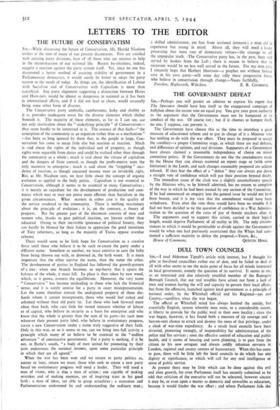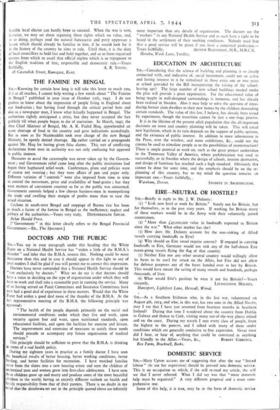DULL TOWN COUNCILS
Sin,—I read Alderman Tiptaft's article with interest, but I thought his gibe at fossilised councillors rather out of date, and he failed to deal at all with what seems to me the main point of focus for all minds interested in local government, namely the question of its survival. It seems to me, as an interested and also relatively youthful member of the Ramsgate Borough Council, that our real troubles have arisen not from a lack of men and women having the will and capacity to govern their local affairs, but from the offensive, launched against local government as a principle of national order, by the Whitehall official and his Regional—yes and County,—satellites, since the war began.
The official or Whitehall mind has always loathed the untidy, but essentially English, system whereby men were, to a considerable extent, at liberty to provide for the public weal in their own locality ; since the war began, however, it has found both a measure of sly courage and a heaven-sent chance to attack and destroy the roots of that privilege, under a cloak of war-time expediency. As a result local councils have been divested, protesting strongly, of responsibility for administration of the police and fire services ; soon the effective control of education and public health, and it seems of housing and town planning, is to pass from the citizen to his now arrogant and always coldly inhuman servants in London, regional and county centres of bureaucracy. When this has come to pass, there will be little left for local councils to do which has any dignity or significance; or which will call for any real intelligence or sense of public service.
At present there may be little which can be done against this evil and alien growth, for even Parliament itself has recently submitted to be _told that criticism of the executive will not be tolerated, however sincere it may be, or even upon a matter so domestic and unwarlike as education,. because it would hinder the war effort ; and where Parliament fails the•
humble local elector can hardly hope to succeed. When the war is won, however, we may set about regaining those rights which we value, and, in so doing, perhaps read the natural bureaucrat and• petty oppressor a lesson which should already be familiar to him, if he would look for it in the history of the country he aims to rule. Until then, it is the duty of local councillors to hold fast and hold together, and so to form organised centres from which to assail that official regime which is so repugnant to the English tradition of free, responsible and democratic rule.—Yours
faithfully, A. R. YOUNG. 28 Cavendish Street, Ramsgate, Kent.



























 Previous page
Previous page